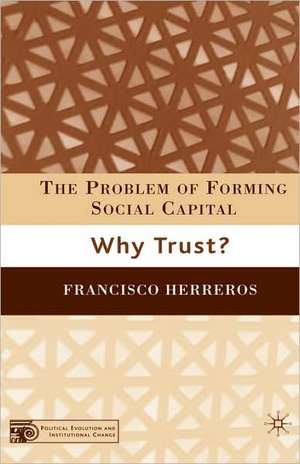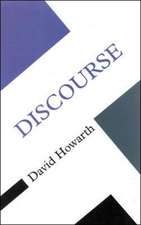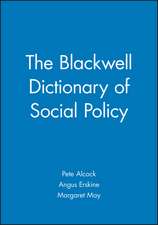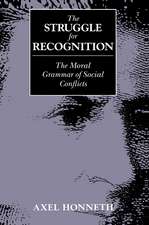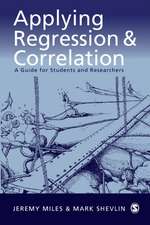The Problem of Forming Social Capital: Why Trust?: Political Evolution and Institutional Change
Autor F. Herrerosen Limba Engleză Paperback – 14 dec 2007
| Toate formatele și edițiile | Preț | Express |
|---|---|---|
| Paperback (2) | 378.54 lei 6-8 săpt. | |
| Palgrave Macmillan US – 14 dec 2007 | 378.54 lei 6-8 săpt. | |
| Palgrave Macmillan US – 13 aug 2004 | 379.48 lei 6-8 săpt. | |
| Hardback (1) | 383.93 lei 6-8 săpt. | |
| Palgrave Macmillan US – 13 aug 2004 | 383.93 lei 6-8 săpt. |
Preț: 378.54 lei
Nou
Puncte Express: 568
Preț estimativ în valută:
72.43€ • 75.48$ • 59.97£
72.43€ • 75.48$ • 59.97£
Carte tipărită la comandă
Livrare economică 03-17 aprilie
Preluare comenzi: 021 569.72.76
Specificații
ISBN-13: 9780230602236
ISBN-10: 0230602231
Pagini: 151
Ilustrații: VIII, 151 p.
Dimensiuni: 140 x 216 x 9 mm
Greutate: 0.19 kg
Ediția:2004
Editura: Palgrave Macmillan US
Colecția Palgrave Macmillan
Seria Political Evolution and Institutional Change
Locul publicării:New York, United States
ISBN-10: 0230602231
Pagini: 151
Ilustrații: VIII, 151 p.
Dimensiuni: 140 x 216 x 9 mm
Greutate: 0.19 kg
Ediția:2004
Editura: Palgrave Macmillan US
Colecția Palgrave Macmillan
Seria Political Evolution and Institutional Change
Locul publicării:New York, United States
Cuprins
Introduction The Concept of Social Capital The Problem of the Formation of Social Capital The Creation of Particularized Trust The Creation of Social Trust The Creation of Social Trust: The Role of the State The 'Virtuous Circle' of the Creation of Social Capital Conclusions
Recenzii
"Herreros, far more than anyone else to date, gives the concept social capital both theoretical and empirical standing. He clarifies the questions that matter, shows how we can answer them, and even answers some. This is a truly cross-national study, informed by sophisticated analytics and imaginative tests of plausible hypotheses. His most important finding is that the state fosters social capital directly through its efficacy in enforcing agreements and indirectly through its subsidies of associations. Herreros thus counters many earlier analyses of social capital and provides the basis for further theoretical and policy advance." - Margaret Levi, Jere L. Bacharach Professor of International Studies, University of Washington
"Herreros's Problem of Forming Social Capital is a well-argued analysis of the importance of trust and voluntary associations in civic life. His argument is not mine, but this is an engaging book that will make an important contribution to debates on social capital. More so than almost anyone else, Herreros presents a clear argument about the underlying mechanisms of social capital. His reasoning will play a key role in the ongoing controversy about how and whether trust and membership in civic associations make democracy work better." - Eric Uslaner, University of Maryland, College Park
"This is a brilliant book. The arguments are rigorous and sharp; the evidence, convincing; the style, incisive and witty. Herreros departs from the mainstream literature on social capital showing, first, that social trust can be explained from a rational choice perspective; and second, that the State can generate social capital. Both on theoretical and empirical grounds, the book is a major contribution to the study of social capital; it is also enjoyable to read." - José María Maravall, Juan March Institute, Madrid
"Herreros's Problem of Forming Social Capital is a well-argued analysis of the importance of trust and voluntary associations in civic life. His argument is not mine, but this is an engaging book that will make an important contribution to debates on social capital. More so than almost anyone else, Herreros presents a clear argument about the underlying mechanisms of social capital. His reasoning will play a key role in the ongoing controversy about how and whether trust and membership in civic associations make democracy work better." - Eric Uslaner, University of Maryland, College Park
"This is a brilliant book. The arguments are rigorous and sharp; the evidence, convincing; the style, incisive and witty. Herreros departs from the mainstream literature on social capital showing, first, that social trust can be explained from a rational choice perspective; and second, that the State can generate social capital. Both on theoretical and empirical grounds, the book is a major contribution to the study of social capital; it is also enjoyable to read." - José María Maravall, Juan March Institute, Madrid
Notă biografică
FRANCISCO HERREROS holds a Ph.D. in Sociology and is a member of the Juan March Institute, Madrid, Spain. Currently, he is a visiting scholar at the New York University, USA.
